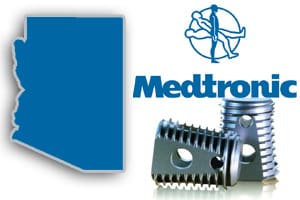
Medtronic Inc.’s bid for preemption was just denied by a federal judge. The case involved the device maker’s highly controversial InFuse bone graft product. The Arizona judge rejected Medtronic’s arguments that federal law preempted a lawsuit brought over claims that the device maker advertised InFuse off-label, according to Law360. The personal injury lawsuit alleges the […]
 Medtronic Inc.’s bid for preemption was just denied by a federal judge. The case involved the device maker’s highly controversial InFuse bone graft product.
Medtronic Inc.’s bid for preemption was just denied by a federal judge. The case involved the device maker’s highly controversial InFuse bone graft product.
The Arizona judge rejected Medtronic’s arguments that federal law preempted a lawsuit brought over claims that the device maker advertised InFuse off-label, according to Law360. The personal injury lawsuit alleges the female plaintiff suffered from back pain following a lumbar fusion procedure in which InFuse was utilized.
Medtronic sought to have the entire complaint dismissed on the grounds that all of the claims are preempted by the Medical Device Amendments to the Food Drug and Cosmetic Act. The Act provide the U.S. Food and Drug Administration (FDA) broad control over the way in which an FDA approved device is made and marketed, Law360 explained. U.S. District Judge G. Murray Snow found that most of the plaintiff’s claims are not preempted under federal law, Law360 wrote.
The plaintiff sued Medtronic earlier this year for fraud, failure to warn, defective design, misrepresentation, negligence, and breach of express warranty. She underwent a lumbar fusion in 2009 to relieve back pain; her surgeon used InFuse, although the device has never received FDA approval for that procedure, the complaint notes. The complaint also indicates that the procedure allegedly cause uncontrolled bone growth near the InFuse implant.
The complaint also accuses the device maker of encouraging physicians to use InFuse off-label by touting the product in journal pieces and ads, despite knowing about the possibly serious side effects, according to Law360. Judge Snow found that the claims traced the plaintiff’s physician’s use of InFuse to Medtronic’s off-label promotion of the device, which are not preempted by federal law as the agency prohibits off-label promotion. “When Medtronic allegedly violated federal law by engaging in off-label promotion that damaged the plaintiff and thereby misbranded the Infuse device, it departed the realm of federal regulation and returned to the area of traditional state law remedies,” the order said.
In a different InFuse case, we wrote that a lower Illinois state court judge denied Medtronic’s bid to dismiss a lawsuit brought over InFuse; however, a Minneapolis judge did grant Medtronic’s motion to dismiss the InFuse claims there.
Judge Laurie Miller based her ruling, in part, on some recent United States Court rulings that found that patients could not sue device makers if the FDA granted approval for the product, according to the StarTribune Business. Although Judge Miller’s ruling is a disappointment for dozens who allege InFuse led to serious injury, the decision does enable them to re-file to include specific fraud allegations that involve Medtronic’s promotion of unapproved InFuse uses.
Recent Supreme Court decisions have applied a legal concept known as preemption, which make it difficult for claims brought over FDA-approved devices to advance in state court, and preemption does enable federal law to take precedence over state law, according to the StarTribune.
Physicians always have the discretion to use medical device products and pharmaceuticals in ways that they deem appropriate, including so-called “off label” or unapproved uses. Industry—device and pharmaceutical makers—is legally banned from promoting their products for uses that are not approved by the FDA. The law is clear on this point and Medtronic, according to many experts, appears to have crossed that legal line when it comes to InFuse.
InFuse, a bone graft product marketed by Medtronic is synthetic, or genetically engineered, recombinant human Bone Morphogenetic Protein (rhBMP-2). The FDA approved InFuse in 2002 for very specific uses. InFuse was designed to stimulate spine growth in patients suffering from lower spinal degenerative disease and was approved for use in one type of spinal surgery and some dental procedures. InFuse is not approved for use on the upper, or cervical spine. In fact, on July 1, 2008 the agency issued a notification warning about InFuse’s association with serious complications when used in cervical spinal fusions.
Medtronic’s marketing of InFuse has been the focus of growing controversy and there are concerns over how InFuse research was conducted, including that it was Medtronic-funded. Medtronic has been accused of promoting InFuse off label, of downplaying the device’s risks, and of overstating InFuse benefits. This led to a Senate probe, an FDA warning, and independent studies.


